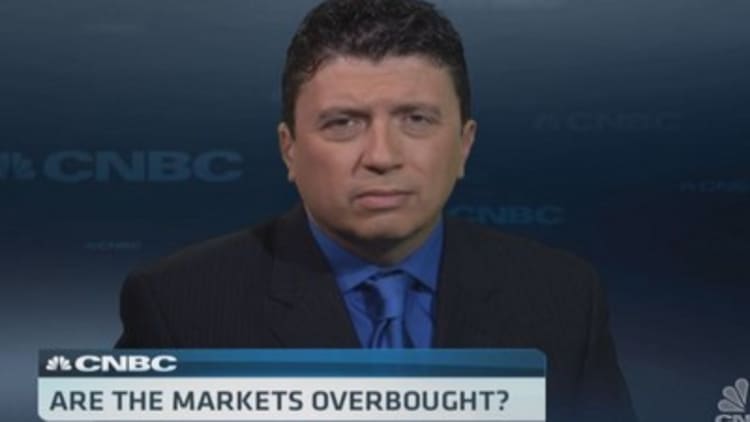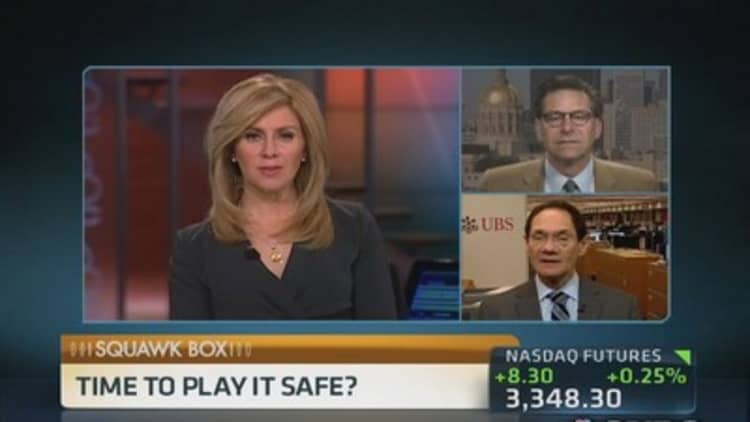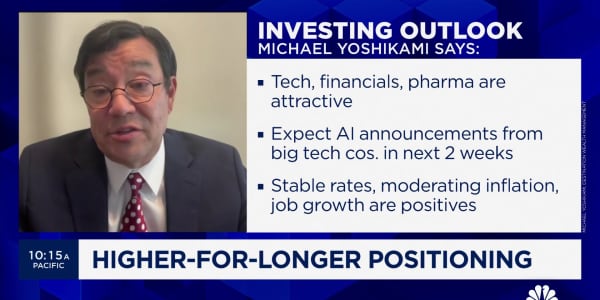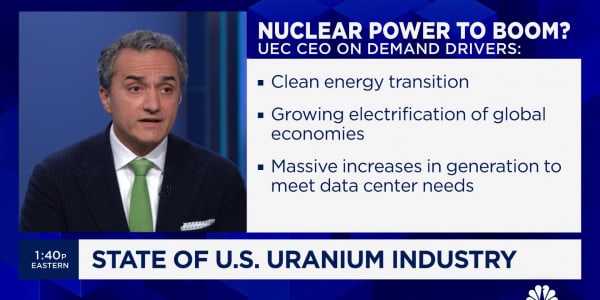
With bullishness seemingly everywhere in sight, the stock market is as overbought as it's ever been, and that doesn't really seem to be bothering many people.
Earlier this week, Bespoke Investment Group labeled the as "extremely overbought," while analysts at Strategas said that from a valuation standpoint the market "exhibited tendencies similar to that of a runaway freight train."
No matter—the stock market went on its merry way Thursday, rallying modestly to threaten new highs.
Investors may be playing a dangerous hand, but there's very little skepticism that things can't keep going on the same track.
One well-regarded pro even wondered whether the market wasn't breeding a band of "liquidity addicts" who were bound to be let down when the day comes that the Federal Reserve and its outgoing Chairman Ben Bernanke no longer can lend historic levels of support to equities.
(Read more: 2 years, no correction, and what's bad about that)
"We think investor conviction in 'Bernanke-care' and belief in an extended era of excess global liquidity is so strong that some investors are uneasy about 2014 becoming a year of speculative excess rather than one of macro, rate and asset allocation normalization," Michael Hartnett, chief investment strategist at Bank of America Merrill Lynch, said in a report. "Suddenly, we believe investors are anxious that they have 'nothing left to fear' but liquidity itself."
The easy comparison is to late 1999, when the Fed decided against tightening amid concerns over the tech stock bubble. The central bank found itself fighting a losing battle when the bubble popped and the market tanked.
Forward to late 2013, when Hartnett posits that a variety of asset classes including U.S. small-cap and Internet stocks are "exhibiting speculative characteristics."
That's not enough to dissuade an otherwise bullish outlook, though BofA's year-end 1,750 target on the S&P 500 already has been passed, fallen and re-passed in recent trading days.
(Read more: ETF investors are making a hugely bullish bet)

Hartnett instead labels the firm's outlook as "speculation pessimists" and "rotation optimists," meaning that investors may have to scour a bit for opportunities.
Likewise, Strategas estimates that stocks have become "fairly valued" though that, too, does not connote a pessimistic outlook.
Both analyses count on economic growth taking the baton from monetary stimulus—a risky position considering most economists are ratcheting forecasts lower for the remainder of 2013.
"The market's propensity to ride momentum and valuations is by no means towering, but for the trajectory of corporate fundamentals to improve the economy's organic growth drivers need to kick into overdrive," Strategas analyst Nicholas Bohnsack said in an analysis.
(Read more: Stock-picker Sass expects 8-year market expansion)
As for rank-and-file investors, the attitude is definitely to the upside.
The most recent American Association of Individual Investors sentiment poll, released Thursday, showed market optimism at a 21-month high. Bulls outweighed bears by margin of 49.2 percent to 17.6 percent.
Indeed, an overbought market alone is no reason to be sour on stocks.
Since 1990, there have only been two other occasions when overbought levels have eclipsed the current state, with all 10 S&P 500 sectors at least two standard deviations above their 50-day moving averages. A plain-English translation of those measures is that the market is trading well above its near-term trend.
On both those occasions, the market leveled out afterwards but never had a decline greater than 4.4 percent over the following year, according to Bespoke.
Still, S&P Capital IQ this week said the average is approaching "a zone of vulnerability" that could pull it down to the 1,710 to 1,725 range.
(Read more: Scary! This bearish call points to 40% market drop)
Even so, the firm expects that to be merely a buying opportunity that takes the index higher and eventually to 1,845 by this time next year.
"During periods of upward market momentum, it is not uncommon for multiples to shoot past long-term averages. In addition, other factors remain favorable for equities, in our view, such as liquidity and seasonality, as well as declining oil prices, interest rates and the value of the dollar," S&P Capital IQ said in a summary analysis. "We therefore remain positive on equities."
—By CNBC's Jeff Cox. Follow him on Twitter @JeffCoxCNBCcom.






